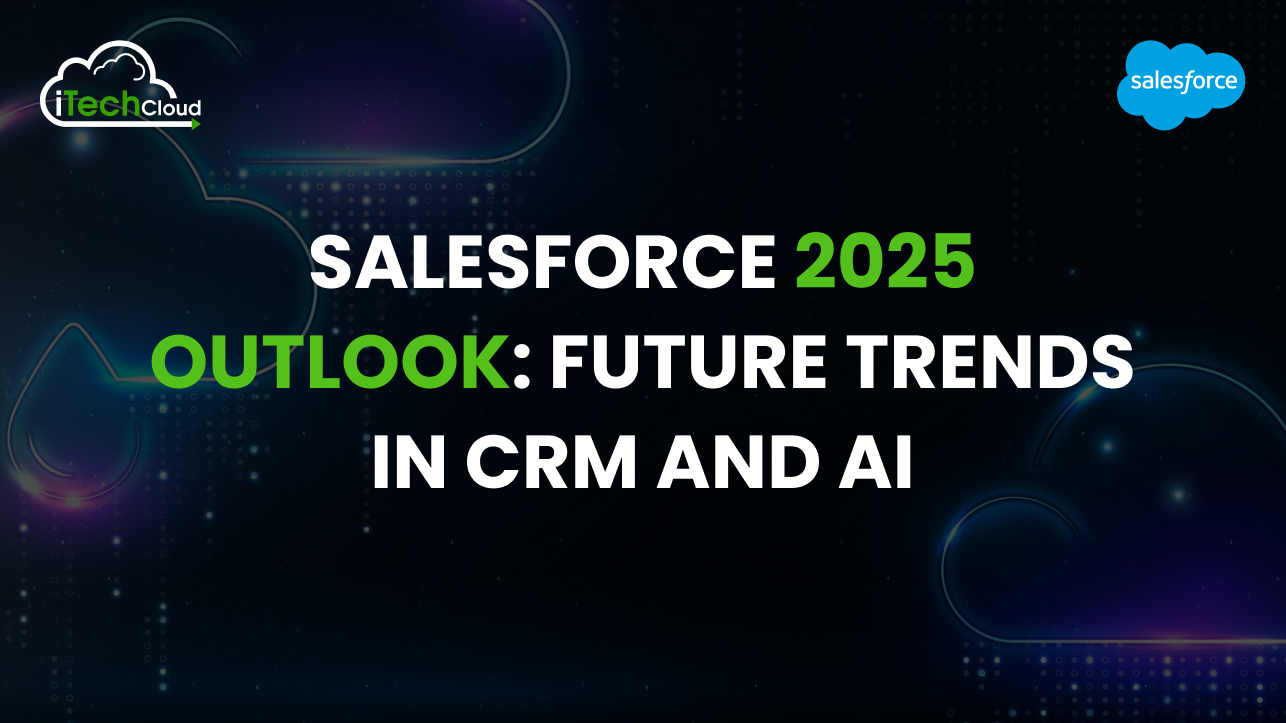Salesforce continues to dominate the Customer Relationship Management (CRM) and Artificial Intelligence (AI) landscape, setting new benchmarks in automation, personalization, and predictive intelligence. The convergence of AI-driven CRM, data analytics, and industry-specific solutions is shaping the future of business operations and customer engagement.
This blog explores the major trends that will define Salesforce in 2025, with a deep dive into how CRM and AI innovations are transforming enterprises globally.
1. AI-Powered CRM: The Evolution from Automation to Intelligence
Salesforce has always been a leader in AI-powered CRM solutions, but in 2025, we are witnessing a significant shift—from basic automation to intelligent, self-learning CRM systems.
a. Autonomous AI Agents and Conversational AI
- Unlike traditional chatbots, modern AI-driven autonomous agents can process complex requests, learn from interactions, and respond with contextual awareness.
- Salesforce’s Einstein AI is now self-learning, meaning it evolves based on user behavior, customer sentiment, and real-time interactions.
- AI-powered virtual assistants are capable of handling end-to-end customer service tasks without human intervention, reducing response time and increasing efficiency.
b. Predictive and Prescriptive AI in Sales and Marketing
- AI is no longer just automating repetitive tasks; it now predicts customer behaviors and recommends actions to sales and marketing teams.
- Predictive lead scoring helps businesses prioritize high-value leads, improving conversion rates.
- AI can suggest personalized marketing campaigns based on real-time customer data, ensuring higher engagement.
2. Data-Driven Decision Making: The New Business Imperative
AI-driven data analytics is at the core of Salesforce’s future CRM strategy, allowing businesses to leverage real-time insights for strategic decision-making.
a. AI-Enhanced Data Intelligence for Smarter CRM
- AI-powered data cleansing tools now automatically detect and correct inconsistencies in CRM databases.
- Real-time data analytics dashboards empower executives with instant insights into customer behavior, market trends, and business performance.
- Salesforce’s AI-driven recommendation engines provide hyper-personalized suggestions, improving customer satisfaction.
b. Democratization of AI: Making Data Science Accessible
- Traditionally, AI-driven analytics required data scientists to interpret complex datasets.
- In 2025, Salesforce will democratize AI by making no-code and low-code AI solutions available to all businesses.
- Users can create custom AI models without needing deep technical expertise, making AI-powered decision-making accessible to everyone.
3. Industry-Specific CRM: Tailoring AI for Every Sector
Salesforce has shifted from a one-size-fits-all approach to customized industry solutions, allowing businesses to maximize CRM efficiency based on their specific needs.
a. Financial Services and Banking
- AI-driven fraud detection is now integrated into Salesforce’s Financial Cloud, ensuring enhanced security.
- Real-time customer risk profiling helps banks offer personalized financial products based on customer behavior.
b. Healthcare and Life Sciences
- The Salesforce Health Cloud now includes AI-powered patient monitoring, ensuring proactive healthcare management.
- Predictive analytics in medical research accelerates drug discovery and enhances patient care.
c. Retail and E-Commerce
- Hyper-personalization in retail allows businesses to use AI-driven CRM to predict customer shopping behavior.
- Real-time inventory forecasting ensures product availability, reducing stock shortages.
4. The Rise of Hyper-Automation in Business Processes
Hyper-automation, powered by Salesforce AI, is transforming business operations, customer service, and workflow automation.
a. AI-Powered Process Automation
- Salesforce Flow Orchestration allows businesses to automate complex workflows, eliminating human intervention.
- AI-driven automation reduces manual data entry, ensuring accuracy and efficiency in CRM operations.
b. Intelligent Document Processing (IDP)
- Salesforce’s AI-powered OCR (Optical Character Recognition) can now process documents, contracts, and invoices without manual input.
- Automated data extraction and categorization help businesses streamline compliance processes.
5. AI-Powered Personalization: Enhancing Customer Experience (CX)
a. The Future of Personalized Customer Journeys
- AI-driven sentiment analysis ensures real-time mood detection, allowing businesses to adjust engagement strategies accordingly.
- Salesforce’s AI-powered voice and text analytics provide deeper insights into customer emotions and preferences.
b. AI-Enhanced Customer Self-Service
- AI-powered self-service portals allow customers to resolve issues independently, reducing support ticket volume.
- AI-driven chatbots and voice assistants improve resolution times and enhance user experience.
6. Salesforce and Generative AI: Revolutionizing CRM Innovation
Generative AI has become a game-changer, allowing Salesforce to create AI-generated content, automated reports, and predictive insights.
a. AI-generated content for Marketing and Sales
- AI-generated sales pitches and proposals help businesses craft data-driven presentations automatically.
- Automated email responses are tailored to customer tone and sentiment, increasing engagement rates.
b. Code-Free AI Model Development
- Salesforce’s Einstein GPT enables businesses to create custom AI models without coding expertise.
- AI-driven automation now includes document summarization, meeting notes, and workflow recommendations.
7. The Ethical AI Movement: Responsible AI in CRM
As AI plays a larger role in business, ethical AI governance has become a key focus for Salesforce.
a. AI Transparency and Explainability
- Salesforce ensures AI decision-making is transparent, allowing businesses to trace AI-driven insights back to their source.
- Customers now have access to explainable AI models, ensuring trust and compliance.
b. AI Bias Mitigation Strategies
- Salesforce AI tools are now equipped with bias-detection algorithms, ensuring fair and equitable CRM outcomes.
- Ethical AI governance ensures data privacy, security, and unbiased decision-making.
8. The Future of AI-Driven CRM: What’s Next for Salesforce?
Looking ahead, Salesforce’s long-term vision includes:
- AI-powered predictive commerce, where CRM suggests the next-best actions based on customer behavior.
- Deeper AI-human collaboration, ensuring AI assists rather than replaces human decision-making.
- Seamless integration with IoT (Internet of Things) to provide real-time customer data insights.
Conclusion: The Road Ahead for Salesforce and AI in CRM
Salesforce 2025 outlook highlights a future where AI-driven CRM is smarter, more autonomous, and deeply personalized. Businesses leveraging AI-powered CRM will experience:
✅ Higher efficiency through automation
✅ Improved customer experiences with hyper-personalization
✅ Smarter decision-making with predictive AI insights
✅ Industry-specific solutions tailored to unique business needs
As we move forward, Salesforce remains a driving force in AI and CRM innovation, shaping how businesses engage with customers and harness the power of intelligent automation.


